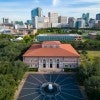
Hispanic Heritage Month celebrations begin Sept. 15
At a time when conversations about culture, identity and belonging are shaping the national dialogue, Rice faculty members can provide context and expertise to enrich coverage of this celebration.

Hispanic Heritage Month celebrations begin Sept. 15
At a time when conversations about culture, identity and belonging are shaping the national dialogue, Rice faculty members can provide context and expertise to enrich coverage of this celebration.

Rice research team on quest to engineer computing systems from living cells
A Rice research team is on quest to engineer computing systems from living cells.

Folding the future: Origami helping Rice engineer Novelino transform materials, structures
Larissa Novelino has built her research on a surprising foundation: the centuries-old Japanese art of paper folding.

Rice to host topping out ceremony Sept. 4 for new residential colleges
Rice will celebrate a major construction milestone with a topping out ceremony marking completion of the highest point of its two newest residential college buildings for Chao and Lovett Colleges.

In the U.S. alone, more than 60 million women of reproductive age have used contraceptives according to the Centers for Disease Control and Prevention, but a new Rice study finds the effects may be more complex — and in some ways, surprising.

New theoretical model sheds light on ovarian aging, offering path toward advances in women’s health
Researchers have developed a mathematical model that enhances our understanding of ovarian aging and the timing of menopause.

Rice alum honored with international award for groundbreaking archaeology research
Rice alumnus Abidemi Babatunde Babalola ’11 ’15 has been named a recipient of the 2025 Dan David Prize, one of the world’s largest history awards.

Wireless implant network could transform cardiac, neurological care
Researchers at Rice and collaborators have developed a wireless network of miniature bioelectric implants that could transform treatment for heart failure, spinal cord injury and other chronic conditions. The system would integrate with patient anatomy easier than conventional medical implants, eliminating the need for batteries and invasive wiring.

Rice to celebrate grand opening of Susan and Fayez Sarofim Hall Sept. 11
The 83,000-square-foot facility designed by Diller Scofidio + Renfro will serve as a hub for visual arts, performance, interdisciplinary collaboration and research-driven creativity.

Rice’s Baker Institute for Public Policy announces fall public programming
Rice’s Baker Institute for Public Policy, ranked the world’s No. 1 university-based think tank, today announced its fall 2025 lineup of public events.

Rice earns nation-leading rankings from Niche, Forbes
Rice has been recognized among the nation’s best colleges this week — coinciding with the beginning of its fall semester — ranking No. 10 on Niche’s 2026 Best Colleges in America list and No. 12 on Forbes’ annual America’s Top Colleges list.

As hurricane season peaks, Rice experts spotlight overlooked Houston flood risks beyond FEMA maps
Rice experts say much of the region’s flood risk still sits outside federally mapped zones.

US Rep. Babin to speak on future of American science at Rice’s Baker Institute
U.S. Rep. Brian Babin (R-Woodville) will explore critical topics in U.S. science and innovation policy to ensure America remains the global leader in emerging technologies and scientific advancement at an Aug. 27 event hosted by Rice University’s Baker Institute for Public Policy.

New Kinder Institute study examines Houstonians’ views on deportation, immigration policy
Rice’s Kinder Institute provides insight into how Houstonians view deportation and related policies.

Wrinkles in atomically thin materials unlock ultraefficient electronics
Rice scientists have discovered that tiny creases in two-dimensional materials can control electrons’ spin with record precision, opening the path to ultracompact, energy-efficient devices.